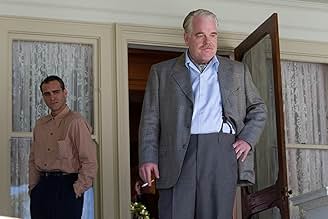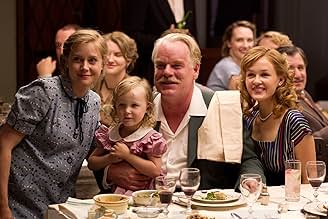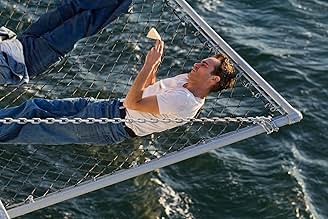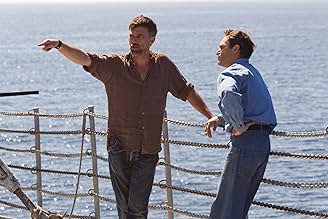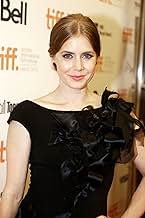Um veterano da Marinha chega em casa da guerra inseguro e incerto sobre seu futuro - até ter contato com a Causa e seu líder carismático.Um veterano da Marinha chega em casa da guerra inseguro e incerto sobre seu futuro - até ter contato com a Causa e seu líder carismático.Um veterano da Marinha chega em casa da guerra inseguro e incerto sobre seu futuro - até ter contato com a Causa e seu líder carismático.
- Direção
- Roteirista
- Artistas
- Indicado a 3 Oscars
- 75 vitórias e 187 indicações no total
Patrick Wilder
- V.A. Patient
- (as Patrick Biggs)
Avaliações em destaque
This is one of those films which the critics were nearly-unanimous in offering universal praise and yet audiences seemed to be relatively dismissive. (The film didn't quite make back its money at the box office.) The performances of Joaquin Phoenix, Philip Hoffman, and the rest of the cast were outstanding, along with the dialog which seems perfectly suited to its characters. Even the sets of the late 1940's and early 1950's were superb. And there are a number of surprising moments in which you don't know where the story is headed. However, by the film's end, I felt like there was something missing, as if the filmmakers were reluctant to take a risk with the material and say something about their subject through the story. About the last half of the film, the story meanders and never finds again its pace or goal.
The film is about the obsession of cult groups which try to answer life's riddles for troubled people. In this case, the group and its leader appear very loosely inspired by Scientology and L. Ron Hubbard, called "the Cause" whose leader is Lancaster Dodd (Hoffman). Although Hoffman plays the title role, the story is really about an ex-naval officer Freddie Quell (Phoenix) who is suffering from PTSD as a result of his involvement in World War II. After the war, he is a lost soul roaming through life with a series of misadventures, such as attacking a customer when he works for a department store as a photographer, or accidentally offering a poisonous drink to a migrant worker.
At his lowest point, he wakes up on board some kind of small yacht and meets a strange man, Lancaster Dodd, who informs him he's aboard his ship at Quell's request, although our protagonist can't remember having boarded. Quell learns about Dodd at their first meeting who states "I am a writer, a doctor, a nuclear physicist and a theoretical philosopher, but above all, I am a man, a hopelessly inquisitive man, just like you." He also says people attack him for his "dangerous" ideas. Slowly, Quell learns that Dodd is head of some kind of an underground movement combining philosophy and pseudo-science and publishes books on some far-fetched ideas which probably have no scientific basis. Dodd is often referred to as simply "Master" by members of this group. Dodd and his group believe the way to "heal" troubled people is by cleansing their souls through a hypnotic process which attempts to heal injuries inflicted during past lives.
Probably the most compelling part of the film is the first half, where we as the audience learn about Dodd and the Cause through the eyes of Quell. The most captivating moment is when Dodd is accused of not only illegally accepting a large donation from a philanthropist through a foundation, but practicing medicine without a license. I thought the film would focus on these accusations, but then the film leaves these indictments far behind. Afterwards, the film meanders, a bit like Quell at the beginning. The film becomes an episodic montage of interesting moments which are rather disconnected. By film's end, I didn't feel much more was revealed about Dodd and his Cause than when Quell first joined during the first third of the film.
Although all the acting is right on the money including outstanding performances by Hoffman and Phoenix, and the script dialog was absolutely true the characters, the entire film was kind of dissatisfying. We as the audience are given hints of the politics of Dodd and his inner circle but often these ideas are never fully developed. Also, much screen time was devoted to many of the "past life" sessions conducted by Dodd, but I think at some point it became wasted screen time. After 3 or 4 sessions, I pretty much understood the idea but instead countless others are offered without giving much insight into Dodd and who he is. By film's end, "The Master" was more like a character study than a story. A noble effort that wasn't quite there for me.
The film is about the obsession of cult groups which try to answer life's riddles for troubled people. In this case, the group and its leader appear very loosely inspired by Scientology and L. Ron Hubbard, called "the Cause" whose leader is Lancaster Dodd (Hoffman). Although Hoffman plays the title role, the story is really about an ex-naval officer Freddie Quell (Phoenix) who is suffering from PTSD as a result of his involvement in World War II. After the war, he is a lost soul roaming through life with a series of misadventures, such as attacking a customer when he works for a department store as a photographer, or accidentally offering a poisonous drink to a migrant worker.
At his lowest point, he wakes up on board some kind of small yacht and meets a strange man, Lancaster Dodd, who informs him he's aboard his ship at Quell's request, although our protagonist can't remember having boarded. Quell learns about Dodd at their first meeting who states "I am a writer, a doctor, a nuclear physicist and a theoretical philosopher, but above all, I am a man, a hopelessly inquisitive man, just like you." He also says people attack him for his "dangerous" ideas. Slowly, Quell learns that Dodd is head of some kind of an underground movement combining philosophy and pseudo-science and publishes books on some far-fetched ideas which probably have no scientific basis. Dodd is often referred to as simply "Master" by members of this group. Dodd and his group believe the way to "heal" troubled people is by cleansing their souls through a hypnotic process which attempts to heal injuries inflicted during past lives.
Probably the most compelling part of the film is the first half, where we as the audience learn about Dodd and the Cause through the eyes of Quell. The most captivating moment is when Dodd is accused of not only illegally accepting a large donation from a philanthropist through a foundation, but practicing medicine without a license. I thought the film would focus on these accusations, but then the film leaves these indictments far behind. Afterwards, the film meanders, a bit like Quell at the beginning. The film becomes an episodic montage of interesting moments which are rather disconnected. By film's end, I didn't feel much more was revealed about Dodd and his Cause than when Quell first joined during the first third of the film.
Although all the acting is right on the money including outstanding performances by Hoffman and Phoenix, and the script dialog was absolutely true the characters, the entire film was kind of dissatisfying. We as the audience are given hints of the politics of Dodd and his inner circle but often these ideas are never fully developed. Also, much screen time was devoted to many of the "past life" sessions conducted by Dodd, but I think at some point it became wasted screen time. After 3 or 4 sessions, I pretty much understood the idea but instead countless others are offered without giving much insight into Dodd and who he is. By film's end, "The Master" was more like a character study than a story. A noble effort that wasn't quite there for me.
I came into The Master knowing almost nothing about it and, knowing (and caring) almost nothing about Scientology, it transpires that I may not have been able to take as much from it as someone going in fully informed and ready to be led by the director. I say this upfront because I have noticed that generally, criticism of this film tends to be met with a snobby dismissal of the individual who didn't "get it" because they weren't smart enough etc. This said, the film started well and it engaged me for well over the first half, building characters and exploring them in a patience rhythmic manner that mirrors the hypnotic delivery of Dodd himself. Sadly this build doesn't have a delivery to speak of and in the second half of the film it really did lose me.
What else it lost was any direction and sense of momentum that it may have had up till that point. The story doesn't go anywhere and it takes its time doing it, meandering through similar ground and offering nothing to really justify the long running time. Some may chose to see this as people complaining about a lack of action etc (again, that snobby of assuming such comments must mean "I need a car chase") but this isn't it at all; the story-telling seems to fall way down a priority list and it is a real shame because so much else about the film is excellent.
The first thing that grabs you is visually how stunning the film is – and it is a factor that remains consistent across the whole film. The colors, the framing and the size of the images are alluring and engaging. I had not heard of Malaimare before seeing his name in the credits, but his work here is terrific. On top of these images we get great use of music that is like a bedding rather than being stuck on top. It is hard to describe but it works very well, spilling under scene after scene and giving the delivery an oddly engaging feel and tone. As everyone has already said, the film is carried with some very strong performances. Phoenix is really great, with ragged edges and internals on display. Hoffman is more patient but also prone to rage when questioned and he balances this well. Adams surprised me the most as I think I didn't expect her to be as good as she was. The three of them (but mostly the lead two) make the film much better by virtue of what they do – and it is just a shame that the story-telling isn't better for them.
Indeed this is true for me of everything, because the film is so well made, looks so beautiful and is a great piece of crafting that it really is such a shame to be left cold by it and to feel it meandering without any momentum or reason. It is a great film and it deserves to be seen for what it does so very well, but in no way is it a good story – and it is this aspect that really lets it down.
What else it lost was any direction and sense of momentum that it may have had up till that point. The story doesn't go anywhere and it takes its time doing it, meandering through similar ground and offering nothing to really justify the long running time. Some may chose to see this as people complaining about a lack of action etc (again, that snobby of assuming such comments must mean "I need a car chase") but this isn't it at all; the story-telling seems to fall way down a priority list and it is a real shame because so much else about the film is excellent.
The first thing that grabs you is visually how stunning the film is – and it is a factor that remains consistent across the whole film. The colors, the framing and the size of the images are alluring and engaging. I had not heard of Malaimare before seeing his name in the credits, but his work here is terrific. On top of these images we get great use of music that is like a bedding rather than being stuck on top. It is hard to describe but it works very well, spilling under scene after scene and giving the delivery an oddly engaging feel and tone. As everyone has already said, the film is carried with some very strong performances. Phoenix is really great, with ragged edges and internals on display. Hoffman is more patient but also prone to rage when questioned and he balances this well. Adams surprised me the most as I think I didn't expect her to be as good as she was. The three of them (but mostly the lead two) make the film much better by virtue of what they do – and it is just a shame that the story-telling isn't better for them.
Indeed this is true for me of everything, because the film is so well made, looks so beautiful and is a great piece of crafting that it really is such a shame to be left cold by it and to feel it meandering without any momentum or reason. It is a great film and it deserves to be seen for what it does so very well, but in no way is it a good story – and it is this aspect that really lets it down.
My Rating : 8/10
Inspired by Scientology founder L. Ron Hubbard and the development of a cult, 'The Master' is a drama-piece through and through.
The movie doesn't have a message or goal as such and sort of does it's own thing.
The things worth watching are the terrific performances, weird content and some very fine cinematography.
Inspired by Scientology founder L. Ron Hubbard and the development of a cult, 'The Master' is a drama-piece through and through.
The movie doesn't have a message or goal as such and sort of does it's own thing.
The things worth watching are the terrific performances, weird content and some very fine cinematography.
Paul Thomas Anderson's "The Master" is a puzzling, often bewildering film. Very few films have left me shaken and stirred and still leave me wondering, "What was that all about?" I can't say that I hated the ride. It is, quite simply, a remarkable film from one of America's best filmmakers today. This film is not for everyone, however.
The film's center plot; the one about self-described nuclear physicist, philosopher and professor Lancaster Dodd and his "organization" "The Cause" - as seen from the point of view from a shell-shocked psychotic drunk Freddie Quell. During the course of the film Lancaster and Freddie bond somewhat with Lancaster progressing his latest works.
The main performances by Joaquin Phoenix and Philip Seymour Hoffman are superb, and should warrant both of them Academy Award Nominations for Best Actor. Both of them. Phoenix is literally on fire here, his quirky mannerisms, twitching lips, unforgiving, unsettling eyes and ferocious anger and voice had me on the edge every time I see him on screen. Hoffman also is more subtle, though we see growing anger and rage whenever he feels that his work is being threatened. He can be classy, charismatic, and when threatened, loses all of that and becomes about as desperate as Freddie. Brilliant work by both actors. Watch the scene where Lancaster gets through to Freddie, or the harrowing scene where both of them are in jail cells. Special mention to Amy Adams who, while not really standing out, gives off a peculiar and somewhat sinister aura whenever she's on the screen.
Anderson's solid screenplay and his concentrated direction bring the goods. There seems to be a pattern about Anderson's last three films including this one. Both "Punch-Drunk Love" and "There Will Be Blood" featured lead characters who are extremely lonely and prone to snap to anger. "The Master" is somewhat a bit of both, where the lonely man can be both psychotic without reason and yet there are scenes which show he is, after all, a man. Some very well written lines ("If you can find peace without looking up to a master, any master...") meshed with some really great cinematography by Mihai Malaimare Jr. that brings nice color tones to the 1950 production design. Complementing all of this is Jonny Greenwood's eerie, dissonant score which makes the movie all the more odd, unsettling, and yet compelling to watch.
Eventually, both men in the movie are the masters of their own fate, and Anderson his own. It may move some and it may turn away others, but this is a fascinating watch nonetheless. "The Master" is one of 2012's very best films.
Overall: 91%
The film's center plot; the one about self-described nuclear physicist, philosopher and professor Lancaster Dodd and his "organization" "The Cause" - as seen from the point of view from a shell-shocked psychotic drunk Freddie Quell. During the course of the film Lancaster and Freddie bond somewhat with Lancaster progressing his latest works.
The main performances by Joaquin Phoenix and Philip Seymour Hoffman are superb, and should warrant both of them Academy Award Nominations for Best Actor. Both of them. Phoenix is literally on fire here, his quirky mannerisms, twitching lips, unforgiving, unsettling eyes and ferocious anger and voice had me on the edge every time I see him on screen. Hoffman also is more subtle, though we see growing anger and rage whenever he feels that his work is being threatened. He can be classy, charismatic, and when threatened, loses all of that and becomes about as desperate as Freddie. Brilliant work by both actors. Watch the scene where Lancaster gets through to Freddie, or the harrowing scene where both of them are in jail cells. Special mention to Amy Adams who, while not really standing out, gives off a peculiar and somewhat sinister aura whenever she's on the screen.
Anderson's solid screenplay and his concentrated direction bring the goods. There seems to be a pattern about Anderson's last three films including this one. Both "Punch-Drunk Love" and "There Will Be Blood" featured lead characters who are extremely lonely and prone to snap to anger. "The Master" is somewhat a bit of both, where the lonely man can be both psychotic without reason and yet there are scenes which show he is, after all, a man. Some very well written lines ("If you can find peace without looking up to a master, any master...") meshed with some really great cinematography by Mihai Malaimare Jr. that brings nice color tones to the 1950 production design. Complementing all of this is Jonny Greenwood's eerie, dissonant score which makes the movie all the more odd, unsettling, and yet compelling to watch.
Eventually, both men in the movie are the masters of their own fate, and Anderson his own. It may move some and it may turn away others, but this is a fascinating watch nonetheless. "The Master" is one of 2012's very best films.
Overall: 91%
I had no clue what I was heading into when I pressed play. I think it's really hard to make a bad movie when you have Philip Seymour Hoffman, Jaoquin Phoenix, Amy Adams, and Jesse Plemons leading the charge. Hoffman and Phoenix are fully absorbed into their characters and the film forces its audience to try and follow these conversations that somehow feel super grounded (due to Hoffman's amazing delivery) and unsettling at the same time. This movie really could not have worked without the talent of these actors.
Amy Adams does so much with so little screen time; I do wish we got more time with her but I think her lack of presence contributes to the messaging of the film. She gives an extremely pulled back/subtle performance of a woman that is truly in the middle of the storm.
This feels fresh and distinct from any other movie I've watched, so I'd definitely recommend it.
Amy Adams does so much with so little screen time; I do wish we got more time with her but I think her lack of presence contributes to the messaging of the film. She gives an extremely pulled back/subtle performance of a woman that is truly in the middle of the storm.
This feels fresh and distinct from any other movie I've watched, so I'd definitely recommend it.
Você sabia?
- CuriosidadesDuring the jail cell scene, Joaquin Phoenix breaks a real toilet. His actions were entirely improvised. Due to the historical past of the building where the scene took place, the toilet was considered "historical." Joaquin had no intentions to break the toilet, nor did he think it was possible.
- Erros de gravaçãoIn the "pacing" scene, as Quell goes from wooden paneled wall to window and back, the second time he goes to he wooden paneling, he breaks out a panel when he pounds it with rage. In the numerous successive shots, the wood panel is restored.
- Citações
Lancaster Dodd: If you figure a way to live without serving a master, any master, then let the rest of us know, will you? For you'd be the first person in the history of the world.
- Cenas durante ou pós-créditosAfter its title, this film has no further opening credits.
- ConexõesEdited into Conspiracy: The Hollywood Syndicate (2015)
- Trilhas sonorasBaton Sparks
From '48 Reponses to Polymorphia'
Written by Jonny Greenwood
Performed by The Aukso Chamber Orchestra
Courtesy of Unreliable Ltd.
Principais escolhas
Faça login para avaliar e ver a lista de recomendações personalizadas
- How long is The Master?Fornecido pela Alexa
Detalhes
- Data de lançamento
- País de origem
- Idiomas
- Também conhecido como
- The Master: Todo Hombre Necesita Un Guía
- Locações de filme
- Mare Island, Vallejo, Califórnia, EUA(as Philadelphia, Pennsylvania and various houses, a park and the docks)
- Empresas de produção
- Consulte mais créditos da empresa na IMDbPro
Bilheteria
- Orçamento
- US$ 32.000.000 (estimativa)
- Faturamento bruto nos EUA e Canadá
- US$ 16.377.274
- Fim de semana de estreia nos EUA e Canadá
- US$ 736.311
- 16 de set. de 2012
- Faturamento bruto mundial
- US$ 28.689.359
- Tempo de duração
- 2 h 18 min(138 min)
- Cor
- Mixagem de som
- Proporção
- 1.85 : 1
Contribua para esta página
Sugerir uma alteração ou adicionar conteúdo ausente







